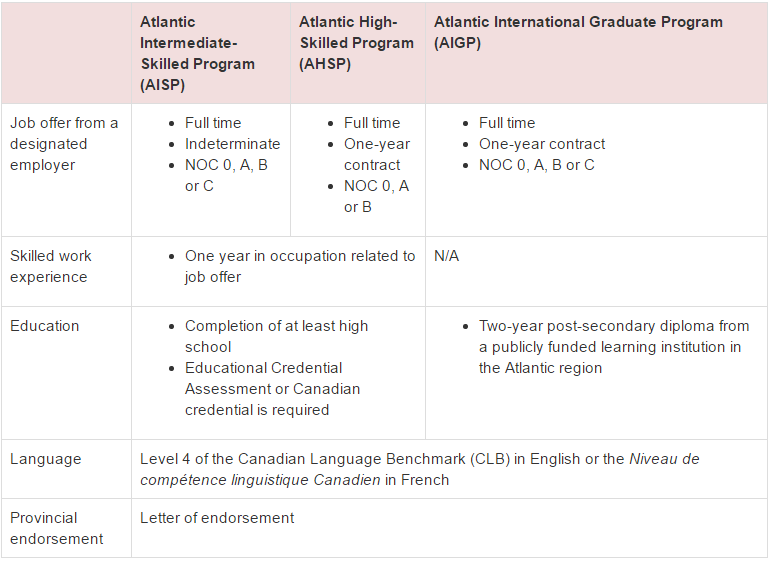Canada’s New Atlantic Immigration Pilot Program a Fresh Opportunity
The Atlantic provinces of Canada have come together with the federal government to launch an exciting new employer-driven immigration program, which is likely to attract the attention of potential immigrants and employers alike.
The Atlantic Immigration Pilot Program (AIPP) has unique eligibility requirements that may be particularly attractive to certain workers and graduates. For example, eligible international students and graduates may note that no work experience is required before an application may be submitted. In addition, workers in intermediate level (National Occupational Classification C) occupations, as well as workers with limited language ability, may be able to immigrate through this program.
It should be noted that the program is also open to workers in management, professional, technical, and skilled trades occupations (NOC 0, A or B).
The AIPP is a new venture that involves the provinces of Nova Scotia, New Brunswick, Prince Edward Island, and Newfoundland and Labrador. The former three provinces are often known collectively as ‘the Maritimes’.
According to Canada's 2017 Immigration Plan, this program will facilitate the entry of 2,000 principal immigrants into Atlantic Canada in 2017. Immigration, Refugees and Citizenship Canada (IRCC) is scheduled to begin receiving applications for permanent residence through the AIPP in March, 2017.
Background
Plans to establish the AIPP were first announced following a meeting between the provincial heads of government last summer. At that time, then Immigration Minister John McCallum said that he heard "loud and clear" the message that Atlantic Canada wants to attract more immigrants to settle in the region. The governments of these provinces recognize the need to solve labour market and demographic challenges.
The three-year pilot program aims to address resource gaps that certain sectors are facing, and to help businesses attract and retain global talent.
The program includes two sub-programs for skilled workers:
- Atlantic High-Skilled Program (AHSP)
- Atlantic Intermediate-Skilled Program (AISP)
and one sub-program for international graduates:
- Atlantic International Graduate Program (AIGP)
It has not yet been clarified how the intake may be distributed between the sub-programs. Additionally, it is not yet clear whether the provinces will receive an equal share, or whether it may be divided per capita or by industry, or some other measure.
Requirements
The work experience, education, and job offer required will depend on whether the applicant is a worker or an international graduate.

The attraction for potential new immigrants
Despite the program being new on the scene and having a limited application quota for this year, it is nonetheless a program with a relatively broad base. As such, different kinds of potential applicants may be attracted for different reasons.
For example, many Canadian immigration programs, including the federal economic programs processed through the Express Entry system, require applicants to have at least one year of skilled work experience in a NOC 0, A or B position. The Atlantic Intermediate-Skilled Program of the AIPP, however, opens the door to individuals whose work experience and/or job offer is in the NOC C category. These occupations usually require secondary education and/or occupation-specific training.
In addition, potential applicants may note that the language requirement is set at Canadian Language Benchmark (CLB) 4, or fluent basic level, a significantly lower threshold than what is required for most Express Entry candidates. Consequently, the AIPP may attract individuals who are not currently eligible to enter the Express Entry pool, as well as candidates who are in the pool but who wish to expand their potential immigration options.
A pathway to PR for students and graduates
In keeping with Canada’s desire to attract and retain an increasing number of international students and graduates, the AIPP includes a sub-program for graduates of eligible institutions in the region. Indeed, the Atlantic region has a long and proud history in the realm of higher education and research. For example, and despite a population of under one million, Nova Scotia alone boasts no fewer than 10 degree-granting universities, the highest concentration per capita in Canada.
Typically, Canadian immigration programs aimed at graduates require the applicant to have at least a few months’ work experience post-graduation. The AIPP sub-program for graduates, however, does not require candidates to have such work experience, resulting in a more straightforward pathway to Canadian permanent residence.
Graduates must have graduated from one of these institutions in order to be eligible under this program.
The attraction for employers
The Atlantic region is not like Toronto, Montreal, or Vancouver, in that the urban areas of Atlantic Canada are far smaller than Canada’s largest cities, which together attract a majority of newcomers to the country. Therefore, the job market in the Atlantic region is smaller.
Employers in Atlantic Canada require additional public support, and this pilot program, which forms part of the wider Atlantic Growth Strategy, is a clear nod to this reality. The AIPP provides employers with the means to attract new workers who will be ready to begin working in the sector immediately upon arrival. The AIPP aims to ensure that newcomers and their families are provided with settlement support, thereby reducing the risk that these newcomers may move to larger job markets soon after arriving in Canada.
Employers that would like to hire through the pilot program must apply to the province(s) in order to receive designation. Employers with locations in multiple provinces will require separate a designation for each province. To learn more about employer designation, click here.
About the region
Atlantic Canada is an area of stunning natural beauty, from the epic national parks of Newfoundland to the beaches of PEI and New Brunswick, all the way to the quaint villages and bustling city of Halifax, NS, the largest city in the region.
The region is seen as family-friendly, with a wide range of schools, low crime rates, and tight-knit communities. The population of the region as a whole is around 2.4 million.
- Learn more about Nova Scotia
- Learn more about New Brunswick
- Learn more about Prince Edward Island
- Learn more about Newfoundland and Labrador
The next steps
IRCC has stated that it will begin to receive applications under the AIPP as early as March of this year. In the meantime, interested individuals are encouraged to review the eligibility requirements and learn more about the region.
CICNews.com will bring more news updates about the AIPP as and when they occur.
To find out if you are eligible under one of the currently available Canadian immigration programs, fill out a free online assessment form.
© 2017 CICNews All Rights Reserved
- Do you need Canadian immigration assistance? Contact the Contact Cohen Immigration Law firm by completing our form
- Send us your feedback or your non-legal assistance questions by emailing us at media@canadavisa.com




